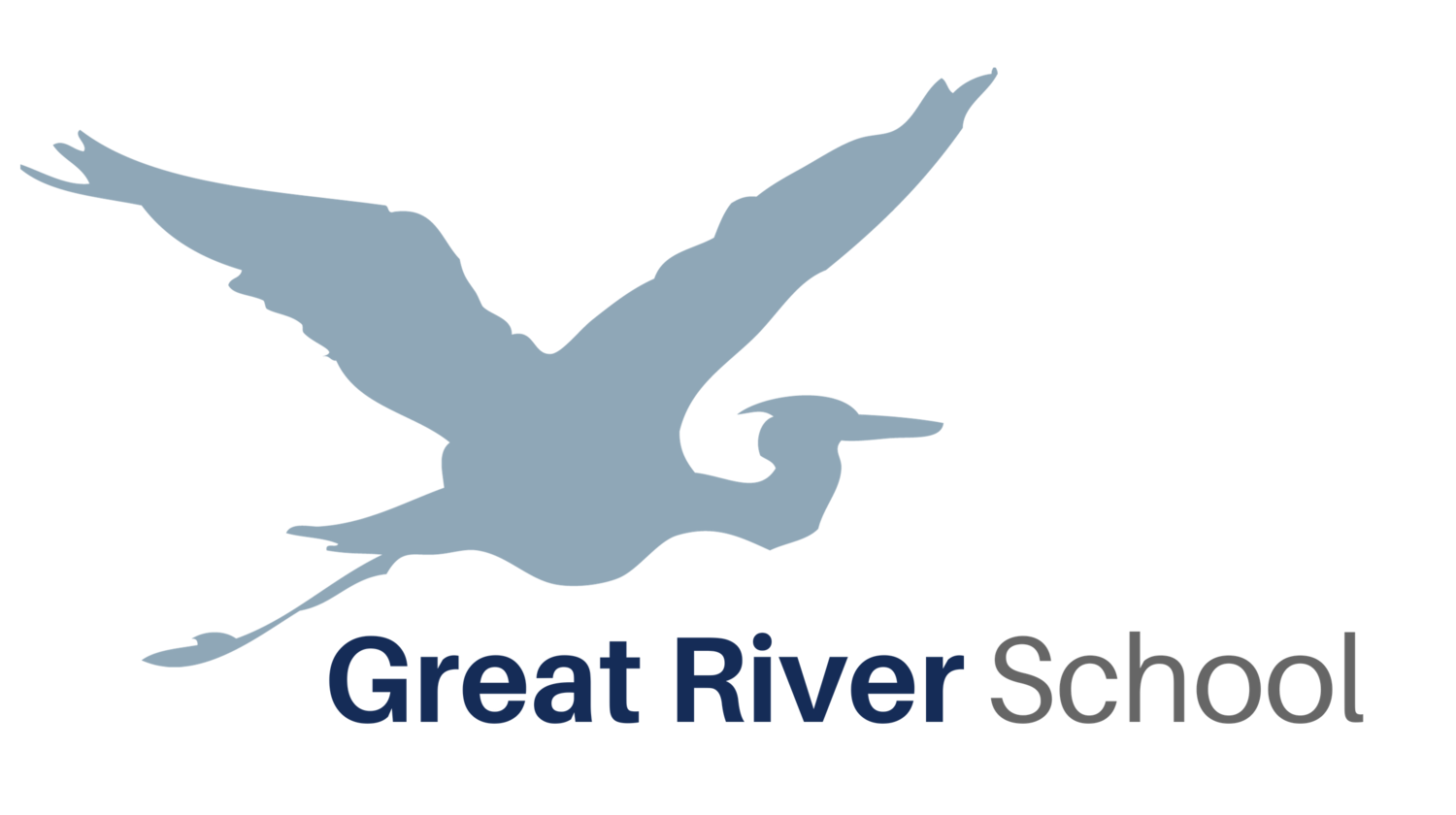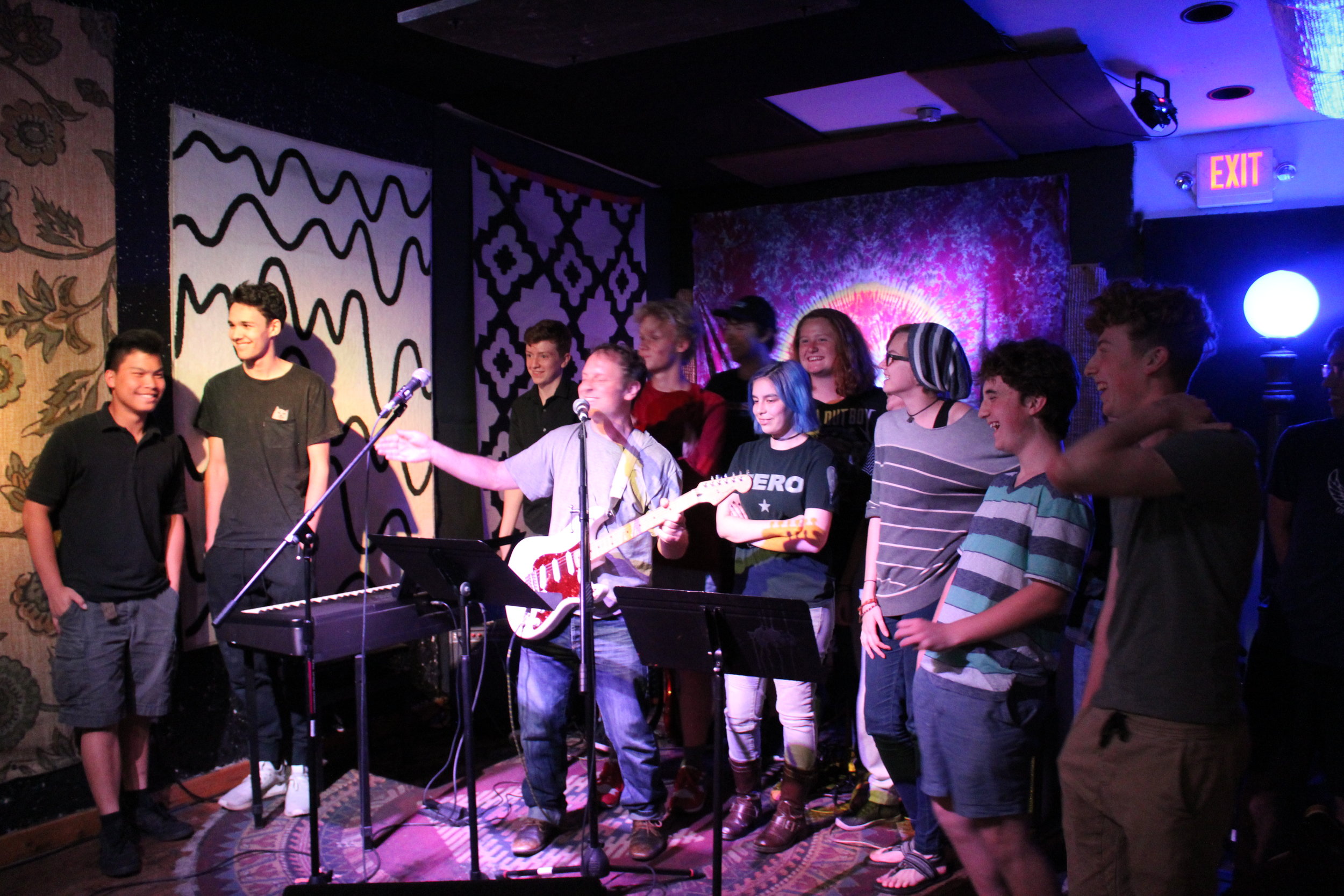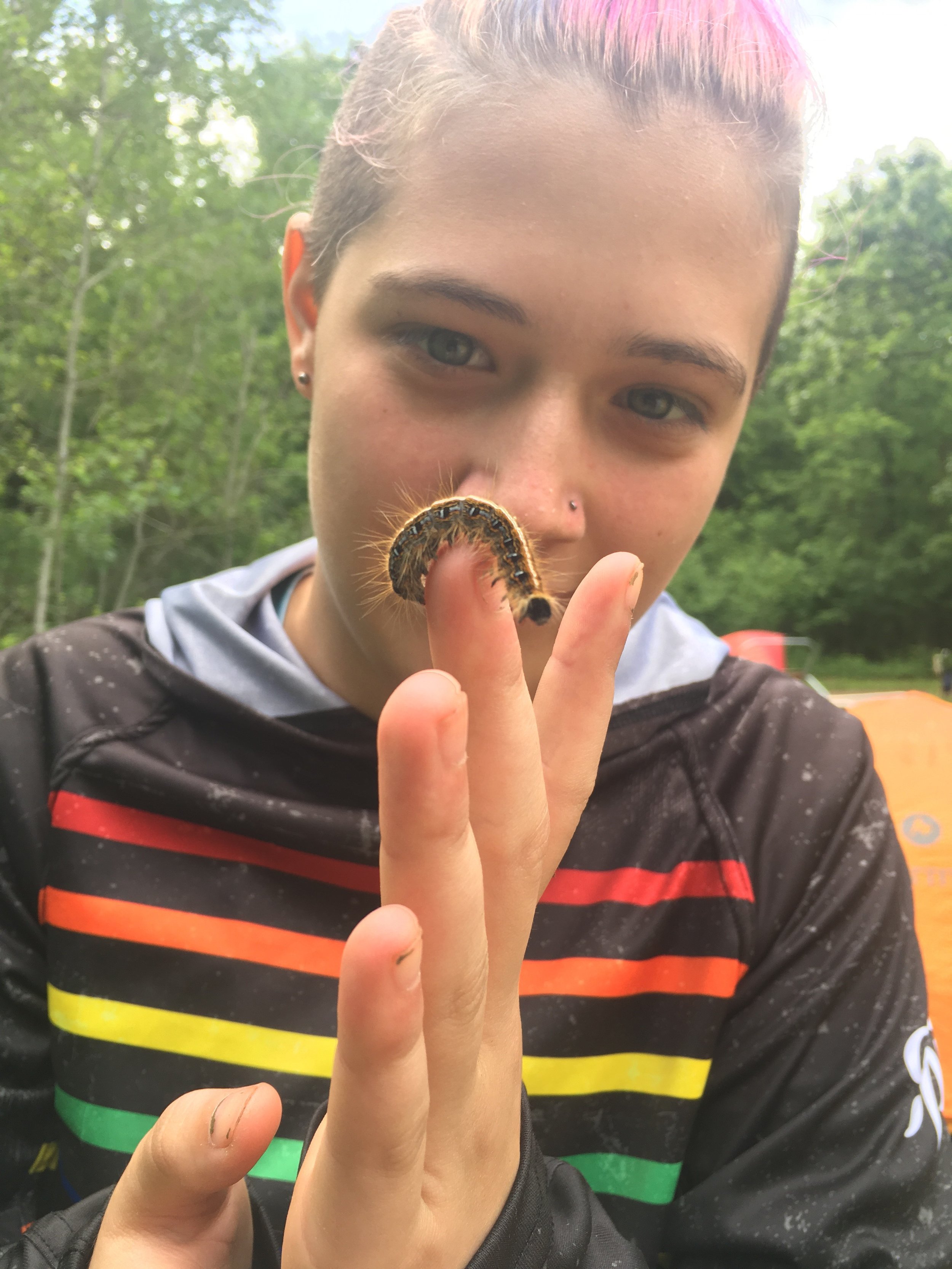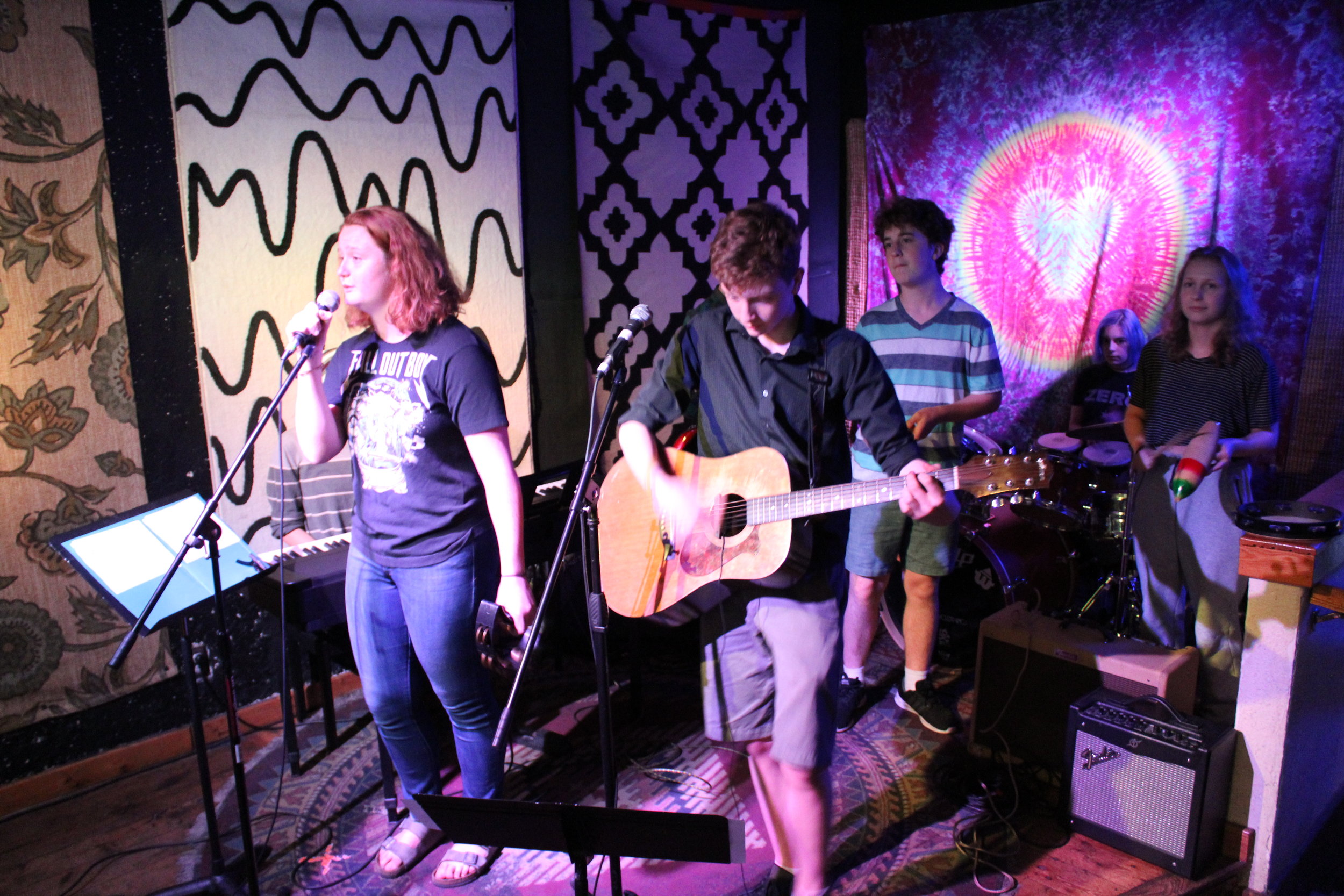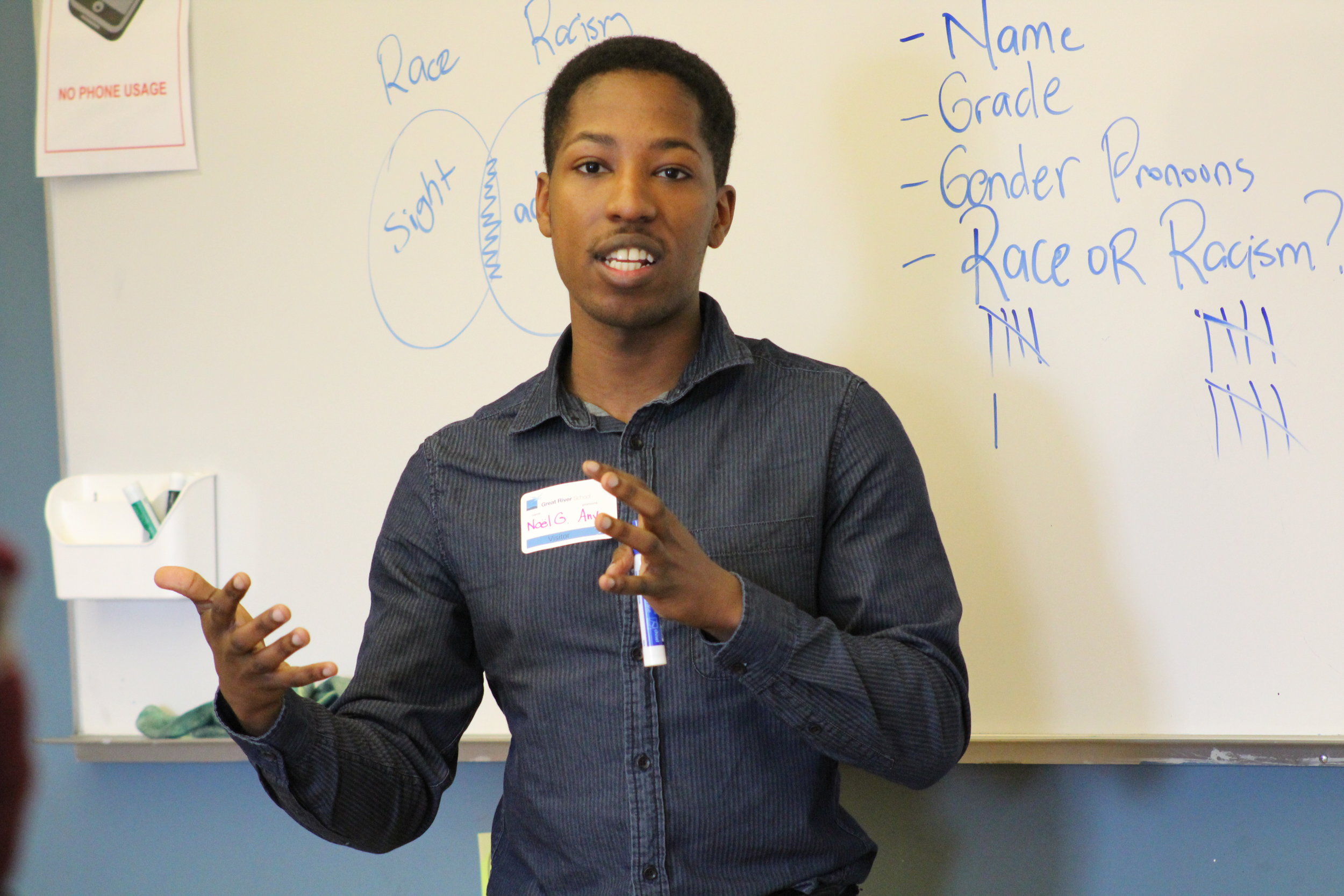For the last four days of school, 9th-12th graders were able to choose between 10+ exciting and skill-building spring intensives. Groups of students rehearsed in bands before performing at the Driftwood, canoed down the Namekagon, went on mural walks, learned how to woodwork, hiked state parks, and so much more. Our students' work built community-supporting skills and ended the school year on a productive high note.
Lower Elementary Students Get a Lesson on Recycling
Upper Elementary students shared a presentation with Lower Elementary classrooms about the importance of recycling.
Some classrooms felt inspired to organize a community cleanup event around the school grounds.
Spring Musical: Cabaret
written by Randi McClure, director, for the Cabaret program
Thea Aitchison (A2) as Sally Bowles, singing "Maybe This Time"
Choosing a musical can be challenging. You spend months planning followed by 8 weeks of intensive rehearsal all for three performances where you put it all out on the line. I have always been more inclined towards smaller shows, ones that stretch actors outside of their comfort zones and ask them to try on characters they may have nothing in common with. When I was in high school I loved roles that let me peer into the complexities of adult life, both the ecstatic highs and wrenching lows. Theater teaches us what it means to be human.
Alice Erickson watches over the lightboard
In the summer of 2017 I was feeling stuck. Every idea seemed too saccharine, too intimidating, or too something else. It was mid August when the idea of Cabaret just wouldn’t go away. It was after watching the white supremacist march in Charlottesville, VA that I couldn’t get Cabaret out of my head. Here were Nazis. In America. In 2017. The idea of directing anything other than Cabaret seemed impossible. The idea of directing anything else seemed cowardly.
I was nervous about picking Cabaret. It’s not what one might call an ‘easy’ show. There were Nazis, tumultuous and sometimes violent relationships and a good deal of it takes place in a seedy nightclub. However, few musicals speak of love, loss, and disillusionment as beautifully as Cabaret.
Finn Scharen (Herr Shultz) & Sarah Erickson (Fraulein Kost) sing "It Couldn't Please Me More (The Pineapple Song)"
The play was inspired by Christopher Isherwood’s novels ‘The Berlin Stories’. Isherwood was a young English novelist who traveled to Berlin to experience the “Golden Age” of jazz, cabarets, and relaxed ideas around of sex and homosexuality. He lived there during the rise of the Nazi party and the people he met inspired his stories of Sally, Herr Schultz and Ernst; they were all based on real people living in the Nollendorfplatz in 1929. Knowing that all of our characters were based on real people gave our rehearsal process a kind of weight. We wanted to do right by these people.
Directing Cabaret has been a profound experience. Watching these young actors research their characters, overcome fears and doubts, and dedicate themselves to finding the truths in their roles fills my heart with such deep affection. With an entirely student-run technical crew and a mostly student filled pit band this show truly belongs to the students that have created it. I feel honored to have worked with this group. I hope you enjoy the show.
Sincerely, Randi McClure
GRS Volleyball Update
written by Kayla Kronfeld, volleyball coach and A1 guide
The 5th/6th grade season wrapped up with a game at Twin Cities German Immersion. The athletes rocked it this season! They went from getting comfortable with postures and passes to nailing serves and spikes! The 5th/6th graders have worked hard to have a team that communicates and runs to the ball--they are doing a wonderful job. Many of the athletes are intending to join a Volleyball Camp this summer and we look forward to having them join us with new knowledge and experience next season!
2018 National Honor Society Inductees
Great River School inducted eighteen students into our National Honor Society chapter on April 25th, 2018. Congratulations to Gregory Ballen, Tacy Lenius, Leonide Sovell-Fernandez, Anna Clements, Sean Clements, Theresa Dart, Emilia Hidalgo, Haley Schmidt, Elias Rojas Collins, Guthrie Pritchard, Clara Sorensen, Helena Grilliot, Frank Steinhauer, Lauren Funke, Eva Fischer, Bea Ibes, Avery Reyes Beattie, and Zack Johnson!
Brand New School Food & Nutrition Programs Starting Fall 2018!
We can sure see the GREAT construction that’s happening as we speak! And a big part of this are our Brand New School Food & Nutrition Programs starting in September!
We appreciate all the input, thoughts, and ideas we’ve heard from many parents and family members, staff, and students. The top three priorities that we are focusing on are: 1) Have Good Quality Food, 2) Serve Healthy Food, and 3) Offer a Variety of Choices. These meet our goal of providing nutritious and appealing food in a positive environment in line with our mission. And we are on our way to success with the following activities taking place ---
The new construction area in the middle of the two initial buildings will have a commercial kitchen that includes instructional space for students, a coffee shop/café with a seating area, and a cafeteria that is a part of the gymnatorium (gymnasium + auditorium). We will have three serving areas; two in the cafeteria and one in the coffee shop. The middle and high school students will have access to these areas before school, throughout the day, and after school. The coffee shop will also be open all day; and elementary students will have access before and after school. We invite parents and family members, as well as community members, to come eat, drink, and enjoy!
The elementary classrooms will have kitchenettes that will provide a learning environment. Lunch and snacks will be set up, served, and cleaned up in the classrooms.
We plan to have the kitchen, cafeteria, and classroom kitchenettes initial construction done by the first day of school, as well as a simple coffee shop to start the year. There will be future work to add instructional space for students and the final design and layout of the coffee shop with students engaging in the operations.
Upon the completed initial construction --- fresh, healthy, scratch-cooked food made by our chef and production assistants will be ready to eat! We will have a variety of breakfasts, lunches, snacks, and coffee shop foods and beverages. Both hot and cold food options, a salad and fruit bar, vegetarian choices, gluten free foods, and other special diet options are all in the works. The elementary classrooms lunches will be sent from the commercial kitchen to each classroom. “To-Go” food using compostable supplies will be available for high school students, as well as all students, to take to their learning environments.
School meal accounts will be set up and all students will have pin numbers to enter into the laptop at the cafeteria and coffee shop cashier areas. Elementary guides will use a manual process to check off the served food in their classrooms. Orders will be taken in advance for elementary students; and middle and high school students will be encouraged to make orders in advance for planning purposes, but the cafeteria and coffee shop options will always be available unless we happen to run out of particular items.
Real, Meaningful Work --- including teaching nutrition education and culinary skills by engaging students in preparing food for our community, building awareness of local farming and environmental sustainability, implementing health and wellness dimensions and role modeling --- and more work will be in the works!
The Name of our Coffee Shop is…….
A GREAT name! We are hearing from everyone --- parents, family, community members, staff, and students. So far, the following ideas for names have been shared:
The Heron Café
The River Side Café
The Coffee Shop
Great River Café
GRS Café/Coffee Shop
The New Café
Blue River Café
Java Jive
The River Cafe
Please let us know your input, thoughts, and ideas anytime --- and Thank You always. Send your ideas to Mary Hunn at nutrition@greatriverschool.org. We’d love to hear from you!
Platte River's Visit to Lyngblomsten Senior Living Center
written by Mary Hallman, Platte River guide
Platte River students wrote poems and made two May baskets for the elderly at the Lyngblomsten Senior Living Center. We walked over on May Day to deliver these, and had a terrific time interacting with the residents. Each student read a poem and left it with the basket for their new friend. I was not allowed to take pictures, but the coordinator did and then sent these to me. It was a very rewarding experience!
Intro Spanish's Mercado Activity
Students from both of Ocean's Intro Spanish classes came together on Wednesday, April 25th to put on a giant Spanish-language Mercado. 6 weeks beforehand, each group of students received the profile of a family of four refugees (invented by Ocean but based on real families in the news).
Students learned about the sponsorship model, where groups of people in a country band together to pool resources, knowledge and power to support incoming refugee groups, a model that is particularly popular and successful in Canada but can also be done here in the United States.
Each student group also had many moving parts: a 'main' store, a 'side' store, a 'free service' — and on the day of the market, using only Spanish and many of the grammar skills they've been learning in class, they had to balance the tasks of selling their wares to the other groups while buying things to support their own refugee family. There were no winners or losers, but after the fact students engaged in a reflection activity about how well they were able to support their refugee families and how the mercado went.
While the mercado had academic value, the best part was watching 9th graders realize that they can indeed communicate using the skills they've learned this first year. Plus, it's fun when Spanish class switches things up! GRS looks forward to many more hands-on experiences from the Spanish department next year — Ocean says there will be a lot of this kind of learning next year in their classes.
GRS Students Meet with Ambassador from Jordan
On April 19, seven Great River juniors and seniors met with the Ambassador of Jordan Dina Kawar to chat and eat lunch at the Minneapolis Club and to hear her presentation on Jordan: A Partner for Peace, Stability, and Prosperity. Thanks to Global Minnesota for providing tickets and opening this event to Great River Global Politics students!
An observation by a GRS senior: "It's interesting to see how far I've come since the beginning of last year in understanding how global politics work and what it means to be a citizen of the world."
A1 Aquaponics Occupation
by Anna Larson-Cheng, April 13th, 2018
On Tuesday, April 10, the A1 Aquaponics class took a trip to Ghandi Mahal, an Indian restaurant located in South Minneapolis. The goal of the field trip was to view and learn about the restaurant's aquaponics system. Aquaponics is when you create a symbiosis between fish and plants. The fish waste will provide nutrients for the plants, while the plants filter the water, which can then go back into the fish tank.
While waiting for the bus that would bring us to Ghandi Mahal, we came up with many questions about the aquaponics system such as: What materials were used to build the aquaponics system? What kind of fish do you use? How many plants do you grow?
We arrived at the restaurant and took part in their absolutely fabulous buffet. After eating, we toured the aquaponics system with its cattle trough of live fish and four raised beds growing healthy, green plants. The water from the cattle trough of fish is cycled through the plant beds. The plants take the nutrients from the fish waste and the water filtered by the plants is cycled back into the cattle trough.
After our tour, we took a picture outside of the restaurant and ran--on full stomachs--to the light rail, which we were about to miss. We made the train, and got back to school in plenty of time.
Overall, I think the trip was rather successful. We learned a lot, and had a great experience
---------
written by Lydia Chung, April 26th, 2018
Hello! This is an update from the A1 Aquaponics crew.
This week, we’ve been very busy! We finally set up the fish tank and are letting it fill with healthy bacteria. Our biologist crew has been contacting companies to purchase fathead minnows from, while our botanists have been faithfully monitoring our plants and creating beautiful watercolors of their growth. Our botanists have also been working on hanging up grow lights to keep the plants happy! In addition to all of this work, we’ve set up a page on Donors Choose to help us fund our water filtration system. Please help us by donating here!
iRace 2018
Thank you so much to all of our volunteers and staff that made iRace 2018 such an incredibly smashing success! With this year’s inclusion of new “Storytelling” sessions, engaging workshops, and a scrumptiously large pot-luck, iRace 2018 was definitely a meaningful and memorable event for all students. iRace sets out to break down boundaries and allow for conversations to happen between students and people of all backgrounds, and this year the iRace team believes that we successfully accomplished our goal, and created a wonderful and engaging experience. We hope to see you all next year!
-iRace student team
iRace student organizers Jack Spicer, Estefany Enriquez, and Britney Thao
Keynote speaker Hanadi Chehabeddine speaks to a group of students about fighting fear and ignorance.
Workshop facilitator Noel Gordon speaks to a room of GRS students
Poetry Out Loud Update
written by Adam Koehler, A2 English teacher and Poetry Out Loud fan
The first week of March saw two of Great River’s own participating in the state semi-finals of the Poetry Out Loud recitation competition. A2 students, Val Heideman and Vasyl Shevstov, shared the stage with several other metro area students. Competitors performed recitations from two different poets to a panel of local literary judges. Each participant shared eloquent and insightful interpretations of poems from writers such as Dickenson, Hughes, Wittman, and Wheatley. It was a supportive and energetic event that shown brightly on talents of our youth.
Avery Reyes-Beattie Wins Major Art Award
Junior Avery Reyes Beattie has been awarded a Silver Key for Excellence in Visual Arts from The Alliance for Young Artists & Writers.
The Scholastic Art & Writing Awards are presented by the Alliance for Young Artists & Writers. The Alliance is a 501(c)(3) nonprofit organization whose mission is to identify students with exceptional artistic and literary talent and present their remarkable work to the world through the Scholastic Art & Writing Awards. Through the Awards, students receive opportunities for recognition, exhibition, publication, and scholarships.
Each year, the Alliance partners with more than 100 visual arts and literary arts organizations across the country to bring the Scholastic Awards to local communities. Teens in grades 7–12 apply in 29 categories of art and writing. In 2018, students submitted nearly 350,000 works of art and writing to the Scholastic Awards.
Avery is pictured above with her award in front of two examples of her artistic work.
Volleyball Update
written by Alexis Dickey, volleyball coach
GRS Volleyball is coming along!
5th-8th years have worked hard practicing their serves, and the 3 hits of bump, set, spike!
We are hearing them call out "Mine!" and "Got It" while digging for the balls.
Most impressive is the joy shared by the teams and the willingness to practice skills and learn while playing:)
Go, team, go!
Conference Bean Count
written by Mary Hunn, nutrition consultant
Bean Counts are Here!
Thanks to all of you that shared what you think regarding the important values to address for our upcoming New Food and Nutrition Programs. At two tables at the Parent conferences, people took three beans and dropped them into the different jars that listed eight different topics. And here are the results --- in order of importance by building!
Elementary:
1. Healthy Food
2. Good quality of food
3. Reducing food waste
4. Variety on menu
5. Good value for meals
6. Sustainable sources
7. Convenient
8. Popular menu items
Adolescent:
1. Healthy food
2. Good quality of food
3. Sustainable sources
4. Good value of meals
5. Enough variety on menu
6. Popular menu items
7. Reducing food waste
8. Convenient
In the School Food and Nutrition Programs surveys sent out awhile ago, these same eight topics were included and our summaries so far show the same top two values — Healthy food and Good quality of food.
If you would still like to complete a survey, feel free to log into https://tinyurl.com/y99vavxt and/or send an email to nutrition@greatriverschool.org. We are very happy to listen to more GREAT thoughts and ideas from everyone!
New Club at GRS: Students for Social Change
Students participating in a walkout organized by SfSC (March 14th, 2018). Students who chose to participate in the walkout left school and gathered by Energy Park Drive for seventeen minutes to honor those killed in Parkland, Florida.
written by Shoshana Schmit and Ryland Kranz
Students for Social Change (SFSC) is an organization of students who want to make a difference in today's society. We believe that us as adolescents deserve a voice in social issues which could help prepare us for controversial conversations and political decisions later in life. Lately we have been focusing on gun reform laws by leading the walk out on March 14th at our school. We also helped raise awareness for the March For Our Lives and we are currently working on a walk out on April 20th that will head to the Minnesota Capitol. We will also focus on other major issues such as Climate Change, Animal Abuse, Body Acceptance and much more. We work towards a better future for us and our children through non-violent protesting and raising awareness for movements we believe in.
Shoshana Schmit, President of Students For Social Change
Ryland Kranz, Vice President of Students For Social Change
Technology in the Great River Elementary Program
written by Erik Akre, Minnesota River LE Guide
When her daughter was entering Kindergarten, my sister visited several schools to see what might be the best environment for her child. She related to me that one Kindergarten classroom had purchased an iPad for each child. The teacher handed them out to the children during the school day for academic purposes. I tried to imagine a room full of five-year-olds hunched over little machines, the environment around them left untouched, unnoticed, and effectively non-existent.
At our faculty retreat in 2013, with such educational situations on our minds, our lower elementary team broke out to discuss the use of technology in our budding program. How might technology fit into our work with children of this age?
We all agreed on the first and most important point in our discussion: the nature of child development at these ages. When children enter first grade, they are just entering Montessori’s second plane of development--a time when abstract thinking and reasoning are only beginning to manifest, and concrete learning is still prevalent. Most children of this age interact with the world by manipulating objects with their senses, and in three dimensions. The use of iPads in our classroom environments is thus unthinkable; this learning object is a flat screen, with all of its distractions and entertainments included.
As children move into the middle of this second plane, around age nine, they become more able to process abstractly, yet three-dimensional, sensory learning remains beneficial as a base from which to work. At all elementary ages, using concrete materials also gives them a chance to work together with peers and develop their social nature--a crucial aspect of development for the entire second plane, ages 6-12.
After our discussion at the retreat, we made a decision that technology--iPads, laptops, or computers--would hold no place in the lower elementary curriculum. In the upper elementary the students use computers, but this is restricted to certain purposes, especially extending research opportunities.
Leaving technology out of the lower elementary, we determined, makes room for other life-long skills. Children learn to sew, knit, write in cursive, develop the strength and versatility of their hands, or organize and sort objects in three-dimensional space. These skills cannot be learned--or learned with any degree of meaning--on an iPad. In a Montessori environment, a child can live life with a more varied skill set while developing along the lines appropriate for their age.
In part, we made our decision based on the fact that students use technology ubiquitously in other areas of their lives. In my experience with children, I have found that video games, television, and movies are among the most discussed topics among the students at school. They are clearly very important. At the retreat, we talked about the need for a “haven” from screen time, providing a place where children could take a break from the experience of two-dimensional entertainment. We want to give them a place to slow down, to center themselves, to be in their bodies. Keeping technology out of the classroom intentionally addresses this issue.
I do not intend here to vilify technology in general. It is an incredibly important aspect of life in our time, and children must have experience with it to prepare for their lives in this world. But in the elementary years, they need a good portion of each day to touch their world, to manipulate it with their hands, to play outside, and to experience the three-dimensionality of their lives as humans beings.
The Montessori environment is a place where children can work to develop themselves along the lines that nature and evolution have provided. Given real objects and real materials with which to learn, elementary children can experience the world in harmony with their developmental stage. And the money that might have been used to buy 30 iPads can be channeled to the purchase of good books, geometric solids, bead chains, grammar boxes, or bus trips to the farm.
GRS Sixth Graders Go Dogsledding!
by Murphy Galvin, Crow Wing 6th Grader
The sixth graders in Crow Wing chose to plan a dogsledding trip at the end of October. We decided on this option because all of us like the snow and LOVE dogs. We were in the fundraising stage for about 4 months, from the start of October to the start of March. We made a lot of the money from events and sales that Everett and his family set up. We left on March 7th and returned on the 8th.
During the trip we went dogsledding, fed and watered the dogs, and snowshoed. The owner, Kathleen made food for us the entire time (everybody loved it). Kathleen’s place is completely off the grid and is heated with wood and powered by solar panels. They have 37 dogs in all in a range from 9 weeks old to 14 years old. Every sixth grader would agree that they had an awesome time and would definitely go back again.
A2 & Black History Month
A2 students engaged with Black History month in a few different celebratory ways this year.
One was tapping into the creativity and joy African American/Black folks demonstrate in our world by creating a song playlist with justification of why these songs resonate with our students.
Another, was taking the theme set forth by the ASALH (Association for the Study of African American Life & History) which was African Americans during Times of War.
10th grade History students practiced historical inquiry and chronological reasoning by sorting primary sources throughout history to hear the African American/black perspective, synthesizing the information for moments of change or periods of continuity.
(written by A2 Social Studies guide, Alexis Dickey)
March 2018 Great River Athletics Updates:
2018 ULTIMATE KICKOFF MEETING
Join us for the 2018 Stars Ultimate Frisbee Season kickoff meeting on Thursday, March 8 from 6:00 - 7:30pm in Maria's Cafe (GRS cafeteria).
Come learn about the 2018 season of Great River Stars Ultimate Frisbee! This will be both an informational meeting and a season kickoff, so all prospective players and their parents/guardians should try to attend. Great River has teams for students in 5th-12th grades. Anyone is welcome to play, regardless of experience.
Email: ultimate@greatriverschool.org email address you have any questions!
GREAT RIVER SCHOOL CO-ED VOLLEYBALL REGISTRATION ANNOUNCEMENT
Who: Attention GRS 5th through 8th grade Great River students! Did you know that we have a co-ed volleyball team? That’s right a volleyball team that is made up of all genders. We are looking to recruit some more players for this team.
When: The volleyball season will be starting the week of February 26th. The first game will be on March 2nd. The season will be going until the first week of May. The season will consist of weekly games on Fridays at 4:30pm with practice held once a week after school at Hancock Recreation Center. The day of practice is still to be determined.
Where: Games will be held at other schools around the metro area each Friday. Practices will be held at Hancock Recreation Center.
How: To sign up please click the following link https://docs.google.com/forms/d/1IN2YyIrw1hJslPkSOK3IWy4JzLNDrVoXMwN-YmyQc3Q/edit
If you have any questions, please send an email to Michael Rausch at
We have some amazing coaches that will be spending time with your students as well.
We are happy to have Great River School guides Alexis Dickey and Kayla Kronfeld as our coaches this year.
Below are some of the amazing benefits to playing an organized sport:
· Burns calories and fat: One of the primary benefits of volleyball is that it helps you burn calories. Harvard Medical School reports a person can burn between 90 to 133 calories during a half-hour game of volleyball.
· Tones and shapes the body: The physical activities involved in playing volleyball will strengthen the upper body, arms and shoulders as well as the muscles of the lower body. Playing volleyball also improves the cardiovascular and respiratory systems.
· Increases metabolic rate: Playing volleyball enhances your energy level and improves your overall performance in other sports and workouts.
· Improves hand-eye coordination: Volleyball is all about hand-eye coordination. When you serve, you must follow the ball with your eyes, and strike the ball at the right point. On defense, you must react to where the ball is going and get in position to make a play.
· Builds agility, coordination, speed, and balance: Due to its quick changes of pace and direction, volleyball places a large number of demands on the technical and physical skills of a player.
· Heart healthy: By getting your heart rate up, your body will circulate more blood and nutrients throughout your body, which improves your overall health.
· Builds muscular strength: Volleyball requires strong core muscles for nearly every play.
· Increases aerobic ability: You expend the same amount of energy playing an easy, slow-paced game of volleyball for 20 minutes as you would jogging one mile.
· Improves interpersonal skills: Volleyball requires that teammates work cooperatively, and at a fast pace. A June 2008 study of individuals who engage in regular team sports found that team members developed better networking skills than those who were less involved in team sports. Leadership and cooperation skills as well as practice handling wins and losses appropriately provide valuable characteristics that transfer to dealing with others in many other situations.
· Boosts mood and increases drive to succeed: Your involvement in volleyball can improve your mood, reduce stress and encourage pride in your accomplishments as a team member. The activity can also improve your self-confidence, self-esteem, your body image and make you feel happier about life in general.
Come on out for volleyball. Have some fun, get some exercise, and come burn up some of that energy that has been bottled up during the long Winter months. To sign up, please click the following link: https://docs.google.com/forms/d/1IN2YyIrw1hJslPkSOK3IWy4JzLNDrVoXMwN-YmyQc3Q/edit
